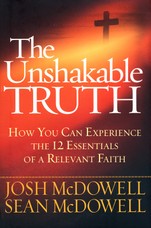Unraveling The Unshakable Truth with Josh McDowell
- Shawn McEvoy & Ryan Duncan Crosswalk.com
- Updated Sep 15, 2010

Christians are commonly told to "have faith" in our spiritual lives, but can those very words also serve as a stumbling block in our walk with Christ? Author Josh McDowell thinks so. In the book co-authored with his son Sean, The Unshakable Truth, McDowell explains how many Christians have traded a relationship with Christ for blind faith. As you'll see in his interview with Crosswalk.com, McDowell believes that it is only when we begin searching for the Holy Spirit that true intimacy with God begins.
Crosswalk.com: Josh, in the press materials for this book you cite a critical void in Christianity right now, one we've noticed at Crosswalk, too. Just this week we ran an article about how even pastors and ministers are losing faith. There just seems to be a lot of people coming to a realization that there's something missing. They cannot define what Christianity means to them. Is that something you're exploring in this book?
Josh McDowell: Yeah. In the Willow Creek Survey, I think it was 54 percent said the greatest thing they need in life is spiritual guidance. But what's staggering, Shawn, is how so many don't understand the very foundation of the Christian faith. Of those who profess to be Evangelical believers, when asked, "What is the Christian life?" 81 percent said, "The Christian life is trying harder to live by the rules in the Bible." That's devastating!
I think many pastors are caught up in that. What we've done is we haven't understood the truth, and we have separated truth from relationships. This is probably one of the biggest things that would usher in postmodernism, emergent village, and community.
CW: Do we need to ask, then: Is Christianity too confusing? Have we done a poor job because of an overemphasis on rules and "do's and don't's" like you mentioned? Is it confusing in and of itself? Is it because the Bible is challenging? Is it because Christians are, by definition, people who are acknowledged failures? And if it is confusing, how do we cut through that?
JM: All of the above! I think one of our biggest mistakes is we have shied away from the Holy Spirit. Extreme Pentecostalism came along, and so the Baptists and others went and swung the pendulum way over to the opposite end. As a result, we have taught truth without teaching the filling and the power of the Holy Spirit. You can't live the Christian life without the indwelling presence and power of the Holy Spirit.
When I researched back to the Council of Nicaea, I found that of the twelve major truths, well, the biggest one was the Holy Spirit. You hardly ever hear anyone talk about it today. This is why, in this book, I think I dealt with it all the way from the Baptist to the Pentecostal.
I would say another factor is we have not applied truth to relationships. Christianity has become cognitive, mental. This is why I disagree with most apologists. I stand over on the other side of the wall from most apologists, because most apologists are mental. They're rational, modernist, and I think modernism is as wrong as postmodernism. It's not truth; it's not relationships. It's truth in the context of relationships.
This is where, if you will notice, in each section of the book I have twelve segments, twelve truths, but the key is the four chapters within each. The first chapter is "What is the truth", because I'm finding Christians don't understand what is meant by a "Creative God." Second, "Why should I believe it? Is it true?" Apologetics. Third is "So what? How does he relate to me?" And fourth, "How can I experience it?" Every single section is divided, and every truth is divided into these four sections.
I would say it does not come down to experiencing it. Here's what is so key today:
- for the older generation, if it's true, it will work;
- for the younger generation, if it works, it is true.
If they don't experience it, it doesn't matter what rational argument you may have, it's not true to them. Why? It doesn't work. That's why we had better get down to let them see it work in the lives of their parents and pastors, or it won't matter what you teach kids.
CW: As far as things being either positional or relational in apologetics, there are a lot of divisive issues out there with Christianity. It seems like you're trying to cut through a lot of these and find the twelve, unifying essentials. Can you tell us about a couple of those, what you find particularly crucial to an understanding of what Christianity really is?
JM: One is understanding the atonement. This was key with the apostles and the early church fathers. Understanding atonement, "Why did Jesus die?"
If you don't understand why Jesus had to die, you can never have correct theology. You can't. Because I've been asked by thousands, "How can a loving God allow anyone to go to Hell?" But the real question is, "How can a holy God allow a sinful individual into Heaven?"
But I've never been asked that, never, and I think our chapter on the atonement is probably a little bit revolutionary. After that, I think the one on the Resurrection.
CW: What are people misunderstanding about the Resurrection?
JM: Well, 52 percent of Evangelical, fundamental, born-again, Christian kids say it never happened.
CW: Wow.
JM: It never happened! This is probably close to the same percentage in adults, and I can almost never, ever, ever find any believer who can give me any intelligent reason for believing in the Resurrection, any evidence for it or anything. Yet, for the apostles, that was the crux. If Christ be not raised from the dead, you can believe all you want about why Jesus had to die, and you'll go to hell. So I would say those two on the atonement and the resurrection were probably two of the most critical.
CW: You just mentioned the term "evidence," and your work for years has focused on evidence for our system of beliefs, and that doesn't change with The Unshakable Truth. Evidence is a prevailing topic in each section. Explain for someone who may not be familiar with your works why considering evidence is so important for people who espouse faith.
JM: Well, I would say two things. One, we can't be saved by faith. That's heresy from the get-go. Second, when most people say, "You have to take it by faith," they are talking about a blind faith. That's not Biblical. The Biblical faith is an intelligent faith. You shall know the truth, and the truth shall set you free.
Study to show yourself approved unto God, we are going to need to not be ashamed, but be ready to always give an answer for the hope that is in you. All the way from Genesis on through is an appeal to evidence, because if any one faith appeals to truth, it is the Christian faith. The Christian faith does not appeal initially to faith. It appeals to truth, faith based upon truth.
The thing is, especially in today's culture with the Internet and everything; we are leveling the playing field with the atheists, Hitchens, and everyone. If you know what you believe but cannot explain why, you will bottom out. You will become a useless Christian if you can't. Now the Internet is forced upon the Church, something it should have done to itself 2,000 years ago, to know why you believe not just what you believe. That is why I teach a section in every chapter on "why I should believe this, is it true?"
There is so much emphasis on faith. I mean, it is unbelievable. You say how are you saved? You are saved by faith? No, you can't be. That is heresy.
CW: Can you elaborate a little bit more on that?
JM: I shouldn't have to! [Laughs.] If you could be saved by faith, you would not need Jesus. Just build up your faith and stay saved.
We are not saved by faith. We are saved by grace through faith in Jesus. You see, what gives faith any value is not if anyone will believe you. That gives faith no value. It is the object of your faith that gives faith value. If Jesus Christ is not who he claimed to be and died on the cross for our sins, was buried and raised again on the third day, ascended into heaven, and sent the Holy Spirit—if that is not true, you can have all the faith you want, the greatest man of faith, and you will go straight to hell.
Then the problem [becomes], "I always believed that the way you think you are saved is the way you live the Christian life." And if you live your Christian life by faith, meaning you live by blind faith, you will never grow. It is the object that is critical.

JM: "You will know they are my disciples by the way they love each other." If you follow these twelve, you are not going to be trying to obey the rules of Scripture; you are going to be living out a relationship with God through Jesus Christ. If we do that, one of our greatest apologetics is Paul's testimony in 1 Thessalonians 2:8: "While we were among you, we not only imparted the truth…"
Stop there. People say, "See? Preach some truth. Preach some gospel." I say that is heresy. Preaching gospel and teaching truth is not what turned the world upside down. Get real.
It goes on to say, "We not only imparted the truth, but we imparted our very lives." In 1 Thessalonians 1:5 Paul said, "By the way that we lived among you was further…" What? "… proof, evidence of the truth of our message." And in Romans 15:18 is it? Paul said, "I won my children to Christ by my message…" People say, "See. He had devotion, and kids, and everything." No. He goes on: "…and by the way I lived before them."
In today's culture, if they do not see it, they will not believe it, and... they shouldn't.
Since 1960, Josh McDowell has written or co-authored 120 books including:
- More Than a Carpenter -- 15 million copies in 85 languages.
- New Evidence That Demands a Verdict -- named one the twentieth century's top 40 books and one of the thirteen most influential books of the last 50 years on Christian thought by World Magazine.
In addition to many other awards, Josh has been nominated 36 times for the Gold Medallion Award and has received that award on four occasions. In spite of all the honors and awards he has received, Josh will tell anyone that his greatest joys and pleasures come from his family. He and his wife Dottie have been married 38 years. They have four children and three grandchildren.
Publication date: September 15, 2010



















